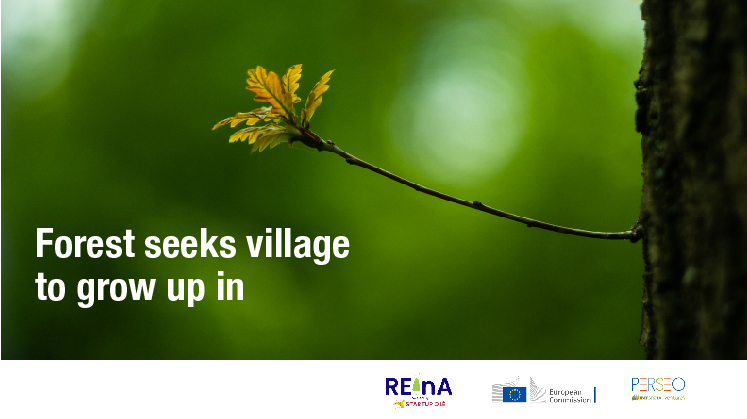Iberdrola rural challenge: Start-up villages
Forest seeks village to grow up in
Cerdedo-Cotobade in Pontevedra, Liérganes in Cantabria and Muelas del Pan and San Cebrián de Castro in Zamora are the four winning villages of the 'Innovation and sustainability in rural areas' challenge, an initiative carried out by Iberdrola in collaboration with Start-up Olé and with the support of the European Commission. This is a pioneering program to promote the recovery of natural spaces in depopulated areas of Spain and Portugal through the conversion of burned or wasteland into forests.

Innovation to reforest villages in Spain and Portugal
The 'Innovation and sustainability in rural areas' challenge aimed to attract investment, create jobs and generate projects in rural areas that ensure a better quality of life and services for the inhabitants of these areas. Open to all municipalities with less than 15,000 inhabitants in Spain and Portugal, the programme assesed the sustainability, entrepreneurship and innovation strategy of the candidates, with special attention to the promotion of renewable energies and the decarbonisation of their economic activity.
To promote this initiative, the Iberdrola - PERSEO international start-up programme had the support of the European Commission and its strategic plan "A long-term vision for the EU's rural areas" through the REInA platform (Rural European Innovation Area), promoted by the University of Salamanca and managed by Start-up Olé.
Objectives of the 'Startup village' rural challenge
-
 Identification of villages committed to sustainability in which to carry out CO2 Revolution reforestation.
Identification of villages committed to sustainability in which to carry out CO2 Revolution reforestation. -
 Sustainable use of rural and public land for biodiversity enhancement, emission reduction and CO2 capture
Sustainable use of rural and public land for biodiversity enhancement, emission reduction and CO2 capture -
 Support in the creation of new job opportunities related to sustainability (reforestation) in rural areas.
Support in the creation of new job opportunities related to sustainability (reforestation) in rural areas.
Participation requirements
To participate, each rural area (referred to in the programme as a "Startup Village") had to complete a registration by providing data that proved its connection and commitment to innovation, entrepreneurship and sustainability. This section took into account the number of start-ups and entrepreneurs associated with each Startup Village, the municipal innovation and entrepreneurship activity (e.g., coworking spaces, events, matchmaking, etc.) and the existing innovation and sustainability strategy and plan, including grants and public support.
The village had to also share general and relevant information about the municipality, such as the number of inhabitants, a description of its commercial and business activity, samples of previous innovative, entrepreneurial and sustainable initiatives and proof of recently reforested or to be reforested land (preferably owned by the municipality).
Prize for the selected village or villages
-
 Reforestation of municipal public land by Iberdrola
Reforestation of municipal public land by Iberdrola -
 Promoting local employment creation
Promoting local employment creation -
 Increasing the natural capital of the municipality
Increasing the natural capital of the municipality -
 Possible implementation of innovative solutions for digitalisation and monitoring of forest and CO2 capture
Possible implementation of innovative solutions for digitalisation and monitoring of forest and CO2 capture -
 Preferential access to the implementation of other sustainable initiatives by Iberdrola with Smart solutions.
Preferential access to the implementation of other sustainable initiatives by Iberdrola with Smart solutions.
The deadline for registration was between 1 January and 31 March 2022. The winner was announced in April 2022 and was implemented between April and December 2022.
Iberdrola's commitment to sustainability
Iberdrola will be in charge of reforesting the land of Cerdedo-Cotobade in Pontevedra, Liérganes in Cantabria and Muelas del Pan and San Cebrián de Castro in Zamora, the four winning towns of the challenge through selective planting with drones and smart seeds, which will be implemented by CO2 Revolution. . All plantations will be carried out with native and diverse species, not only tree species, to ensure the origin of entire ecosystems that promote biodiversity.
With this initiative, Iberdrola is helping to offset CO2 emissions, reducing its carbon footprint and creating new opportunities in these rural areas. The project will enable the recovery of natural spaces and their revitalisation, as the development of various forest environments will promote their recreational and tourist use and contribute to the fight against depopulation by generating local employment.
Reforestation is one of the best tools for mitigating and adapting to climate change. Thanks to its Trees Programme, the company has set itself the target of promoting the planting of 20 million trees during this decade, which will capture approximately 6 million tonnes of CO2 in 30 years. This absorption of carbon dioxide would neutralise the emissions of a car driving around the Earth 116 times.




